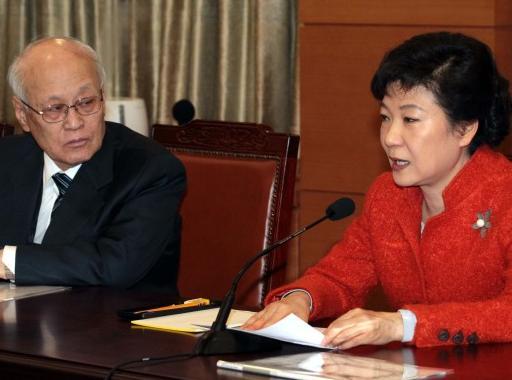Park stung by nomination blunder
President-elect pressured to improve vetting as time is running out for Cabinet appointment
By Korea HeraldPublished : Jan. 30, 2013 - 20:50
President-elect Park Geun-hye is pressed for time in filling her Cabinet lineup following an unprecedented nomination withdrawal by the prime minister-designate Tuesday, which dealt a blow to her leadership already suffering a decline in public approval.
With her secluded decision-making style drawing fire for being off-target, Park faces growing pressure to adopt a systematic personnel screening process to verify her choices.
Park must now start from scratch in naming an alternative figure to become prime minister, who then will work with her to appoint 17 ministers. Park also faces the task of gaining support from the political parties to finalize her government restructuring plans that need to be approved by the National Assembly. Park’s inauguration is slated for Feb. 25.
As it requires about 20 days for the prime minister and minister-designates to be confirmed through the parliamentary hearing and approval process, the government has advised the transition committee to complete the lineup by Feb. 5 at the latest.
With her secluded decision-making style drawing fire for being off-target, Park faces growing pressure to adopt a systematic personnel screening process to verify her choices.
Park must now start from scratch in naming an alternative figure to become prime minister, who then will work with her to appoint 17 ministers. Park also faces the task of gaining support from the political parties to finalize her government restructuring plans that need to be approved by the National Assembly. Park’s inauguration is slated for Feb. 25.
As it requires about 20 days for the prime minister and minister-designates to be confirmed through the parliamentary hearing and approval process, the government has advised the transition committee to complete the lineup by Feb. 5 at the latest.

Observers said it may be inevitable that the new government formation will be delayed when also considering the Lunar New Year holiday on Feb. 9-11.
The disgraceful resignation by Kim Yong-joon exposed a problem within Park’s signature appointment style where only selected insiders are privy to the process, reportedly forgoing the official verification service available through Cheong Wa Dae, the police or the National Tax Service.
The former Constitutional Court chief and current head of Park’s transition committee resigned from his nomination upon escalating allegations of real estate speculation and questions surrounding his sons’ exemption from military service. Neither the transition committee nor the Prime Minister’s Office in charge of preparing for the confirmation hearing was able to counter the spiraling allegations with insufficient data on Kim.
Park’s self-reliant style prioritizing information security over thorough verification of qualification has left an irreversible dent in her preparation for the new government launch, observers said.
“A president who relies on the so-called unofficial figures, who are the president’s close associates but hold no political responsibility, is headed to a 100 percent failure,” professor Lee Sang-don said in a radio interview. Lee had been a member of Park’s political reform committee during the presidential campaign.
The handful of behind-the-scene advisors to Park are said to be Yeungnam University professor Choi Oe-chool, and long-time advisors Lee Jae-man and Jeong Ho-seong.
Park’s earlier personnel choices have also prompted criticism, namely the appointment of journalist-turned-commentator Yoon Chang-jung as her spokesman, for his radical political stance, or the members of her special committee on youth Youn Sang-kyu and Ha Ji-won, both of whom have been involved in irregularities in the past.
Kim’s resignation five days after his nomination was the first voluntary and the fastest resignation by the prime minister-designate of an incoming administration.
Five years ago, the government launch for President Lee Myung-bak was delayed by several days after minister-designates for the ministries of gender equality, environment and unification withdrew their nomination upon various allegations such as real estate speculation.
As Park was seen to fall into a deeper quagmire, the ruling Saenuri Party voiced concerns and a need for a systematic revamp.
“For the new government to launch without a glitch, it is utterly necessary to take necessary verification and confirmation with the support of the National Assembly,” said party chairman Hwang Woo-yea at a party’s meeting.
Supreme Council member Rep. Chung Woo-taik criticized Park’s laxity.
“There are views that the preliminary verification was not adequately carried out as such allegations concerning military service, inheritance tax or real estate speculation can be easily detected by collecting due documentation,” he said.
Rep. Chung Mong-joon suggested the ruling party should step up its role as well.
“The Saenuri Party must faithfully fulfill its role so that the government can do its work properly. While we should assist what we can, we must also voice our opinions when necessary.” He suggested holding regular meeting between the president-elect and the party leadership to “relay public opinion.”
With Park’s transition committee being rapped for being uncommunicative with excessive emphasis on security, Park’s support ratings have been falling since her election last month.
Of the 1,569 respondents surveyed by Gallup Korea on Jan. 21-15, 56 percent of them said Park was doing a good job. It was around 15 to 20 percentage points lower compared to preceding presidents-elect, who tend to enjoy high support ratings prior to or at the beginning of one’s administration launch.
Of those who gave Park low points, 24 percent cited “unverified appointments of figures” as the reason.
The transition committee, meanwhile, continued its operation as scheduled with Kim attending the debate session.
Vice chairman Chin Young told reporters he believed Kim would carry on his role as the committee chairman.
By Lee Joo-hee (jhl@heraldcorp.com)
-
Articles by Korea Herald








![[KH Explains] Hyundai's full hybrid edge to pay off amid slow transition to pure EVs](http://res.heraldm.com/phpwas/restmb_idxmake.php?idx=644&simg=/content/image/2024/04/18/20240418050645_0.jpg&u=20240419100350)







![[From the Scene] Monks, Buddhists hail return of remains of Buddhas](http://res.heraldm.com/phpwas/restmb_idxmake.php?idx=652&simg=/content/image/2024/04/19/20240419050617_0.jpg&u=20240419175937)

![[KH Explains] Hyundai's full hybrid edge to pay off amid slow transition to pure EVs](http://res.heraldm.com/phpwas/restmb_idxmake.php?idx=652&simg=/content/image/2024/04/18/20240418050645_0.jpg&u=20240419100350)

![[Today’s K-pop] Illit drops debut single remix](http://res.heraldm.com/phpwas/restmb_idxmake.php?idx=642&simg=/content/image/2024/04/19/20240419050612_0.jpg&u=)